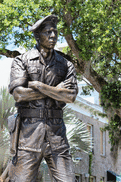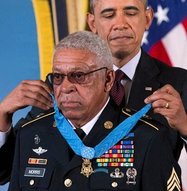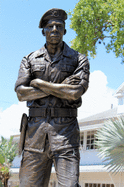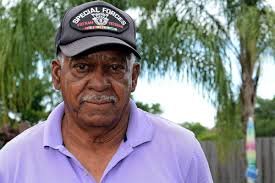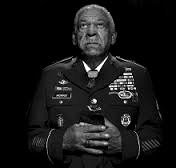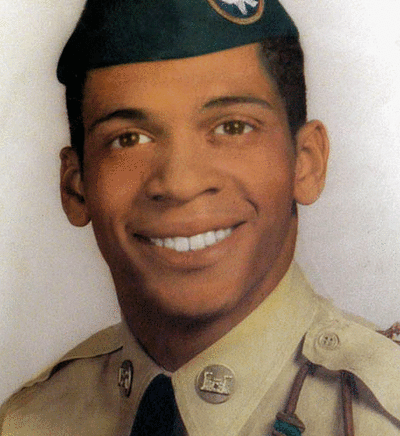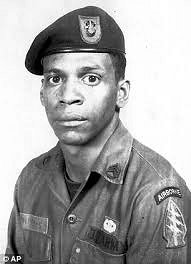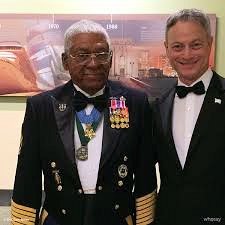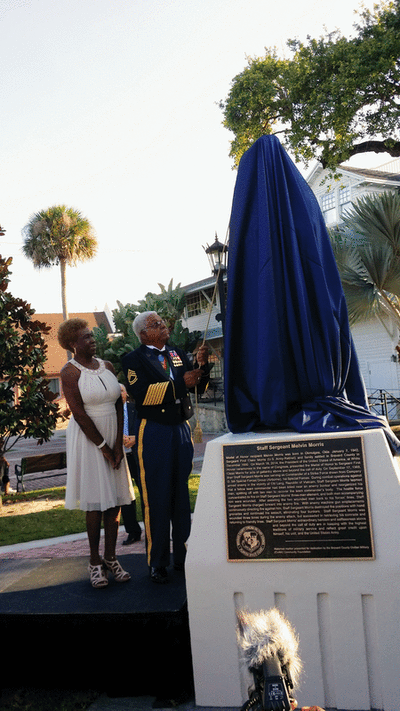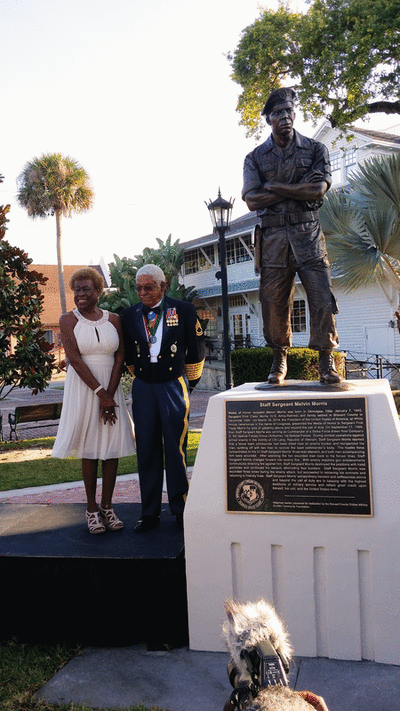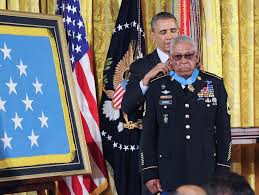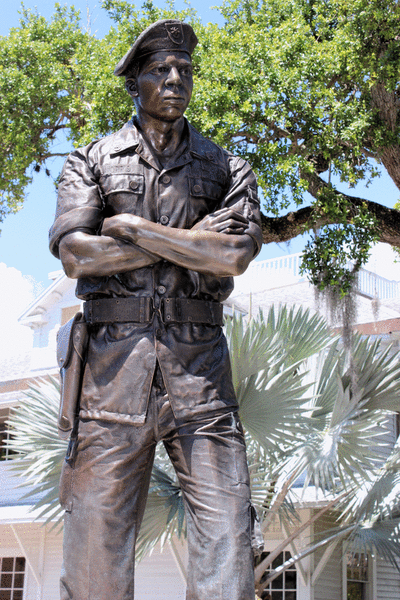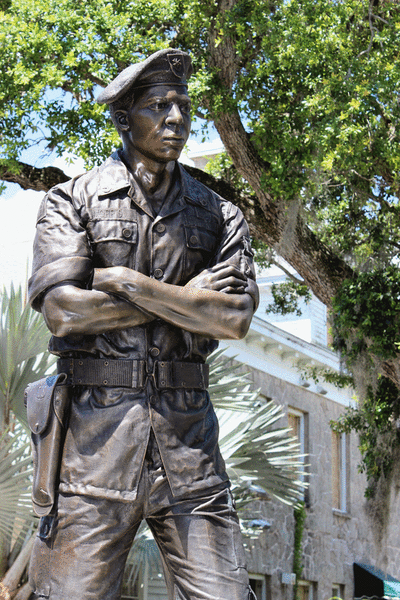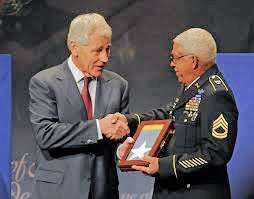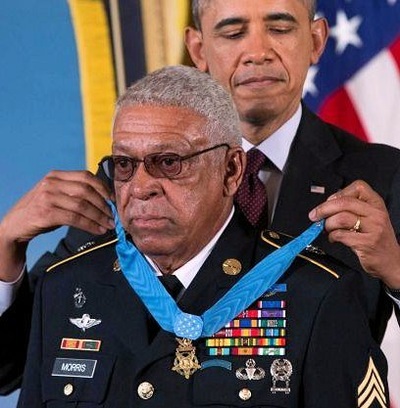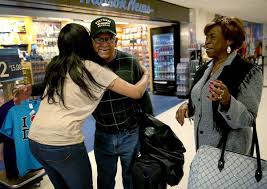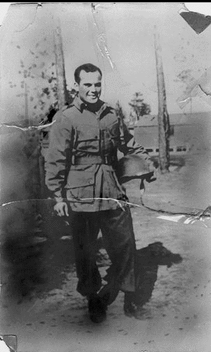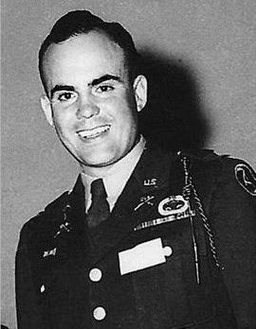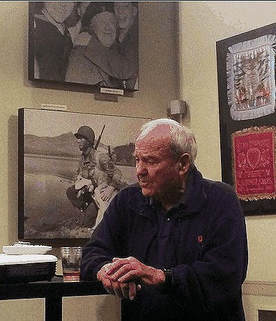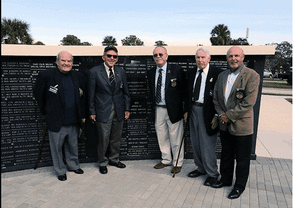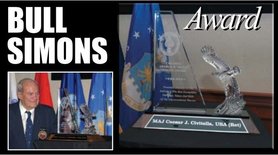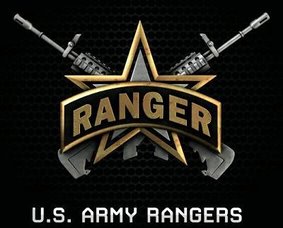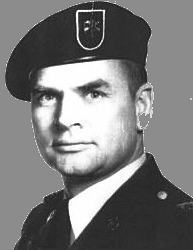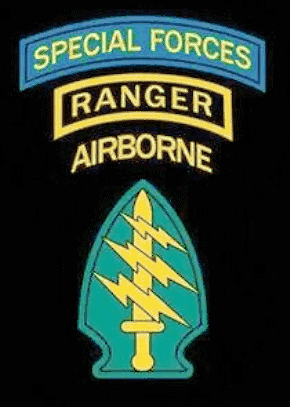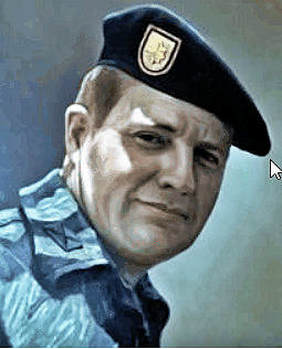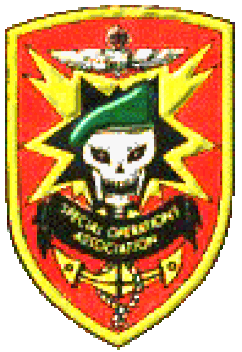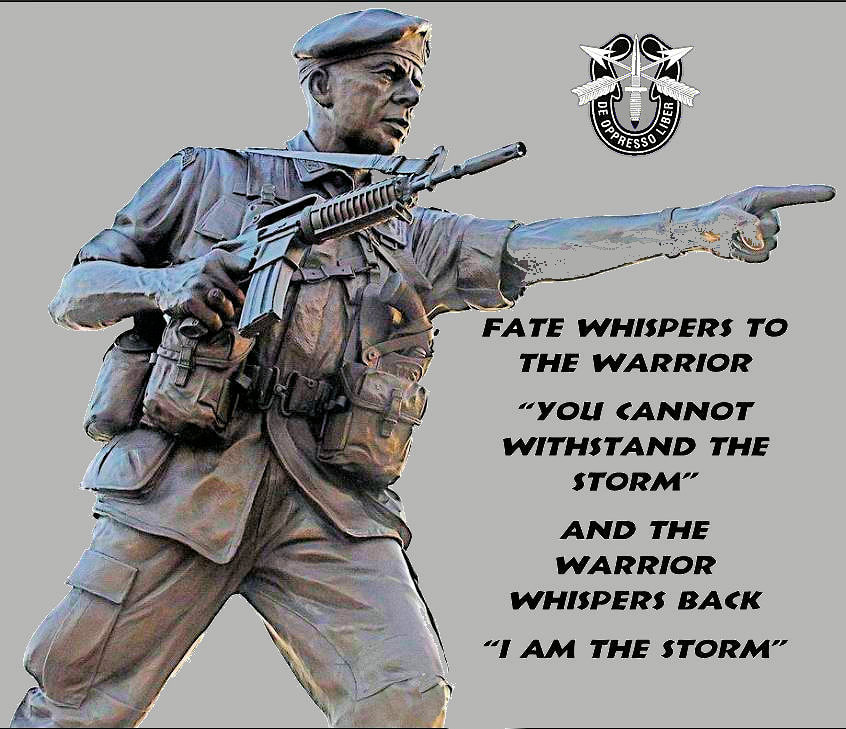|
DUTY
Let us have faith that right makes might, and in that faith let us to the end dare to do our duty as we understand it. ABRAHAM LINCOLN, speech, Feb. 27, 1860 |
HONOR
Better a thousand times to die with glory, then live without Honor. Louis VI of France, 1081 - 1137 |
LOYALTY
There is a great deal of talk about Loyalty, from the bottom to the top. Loyalty from the top down, is even more necessary, and much less prevalent. Gen. George S. Patton, Jr.: War as I Knew It. 1947. |
COURAGE
The bravest are surely those who have the clearest vision of what is before them, glory and danger alike, and yet notwithstanding go out to meet it." Thucydides (460 BC - 395 BC), Greek Historian |

The President of the United States of America, authorized by Act of Congress, July 9, 1918 (amended by act of July 25, 1963), takes pride in presenting the Medal of Honor to:
MELVIN MORRIS
United States Army
For conspicuous gallantry and intrepidity at the risk of his life above and beyond the call of duty:
Staff Sergeant Melvin Morris distinguished himself by acts of gallantry and intrepidity above and beyond the call of duty while serving as Commander of a Strike Force drawn from Company D, 5th Special Forces Group (Airborne), 1st Special Forces, during combat operations against an armed enemy in the vicinity of Chi Lang, Republic of Vietnam on
September 17, 1969.
On that afternoon, Staff Sergeant Morris’ affiliated companies encountered an extensive enemy mine field and were subsequently engaged by a hostile force. Staff Sergeant Morris learned by radio that a fellow team commander had been killed near an enemy bunker and he immediately reorganized his men into an effective assault posture before advancing forward and splitting off with two men to recover the team commander’s body. Observing the maneuver, the hostile force concentrated its fire on Staff Sergeant Morris’ three-man element and successfully wounded both men accompanying him. After assisting the two wounded men back to his forces’ lines, Staff Sergeant Morris charged forward into withering enemy fire with only his men’s suppressive fire as cover. While enemy machine gun emplacements continuously directed strafing fusillades against him, Staff Sergeant Morris destroyed the positions with hand grenades and continued his assault, ultimately eliminating four bunkers. Upon reaching the bunker nearest the fallen team commander,
Staff Sergeant Morris repulsed the enemy, retrieved his comrade and began the arduous trek back to friendly lines. He was wounded three times as he struggled forward, but ultimately succeeded in returning his fallen comrade to a friendly position.
Staff Sergeant Morris’ extraordinary heroism and selflessness above and beyond the call of duty are in keeping with the highest traditions of military service and reflect great credit upon himself, his unit, and the
United States Army.
In addition to the Medal of Honor, Morris received the Distinguished Service Cross, Bronze Star Medal with one Bronze Oak Leaf Cluster, Purple Heart with one Bronze Oak Leaf Cluster, Meritorious Service Medal, Air Medal, Army Commendation Medal with "V" Device and one Bronze Oak Leaf Cluster, Army Good Conduct Medal with one Silver Loop, National Defense Service Medal, Armed Forces Expeditionary Medal, Vietnam Service Medal with one Silver Star, Non-Commissioned Officer Professional Development Ribbon with Numeral "3", Army Service Ribbon, Overseas Service Ribbon with Numeral "4", Combat Infantryman Badge, Master Parachutist Badge, Expert Marksmanship Badge with Rifle Bar, Special Forces Tab, Republic of Vietnam Gallantry Cross with Bronze Star.
Morris was born and grew up in Okmulgee, Oklahoma. In 1959 Morris joined the Oklahoma Army National Guard and soon after joined the active duty Army. "Being in the military was better than being in trouble," he said. He excelled in the military, becoming one of the first Green Berets in 1961 and twice volunteered for tours in Vietnam
Caesar Civitella
D-239-L
1923 - 2017
D-239-L
1923 - 2017
Major Caesar J. Civitella joined the U.S. Army in February 1943. He completed basic training, initially assigned to the Amphibious Engineers at Cape Cod. He then volunteered for and attended basic airborne training at Fort Benning, Georgia, and was assigned to duty at Camp Mackall, North Carolina.
Within a week of this assignment, he was ordered to appear before a screening board for testing of his Italian language fluency and was thoroughly questioned about his background. This began Major Civitella’s career with the Office of Strategic Services (OSS).
In early 1944, after eight-month intense training, Team Lafayette of which he was a part, were inserted into North Africa to support Operation Dragoon—the allied invasion of Southern France. This was his first operational jump behind enemy lines. Team Lafayette, along with two other Operational Groups (OG's), captured nearly 4,000 Axis Soldiers after employing psychological warfare against the finance section of a Nazi Division in France. Following their mission in Southern France, Team Lafayette went to Italy. There he participated in 21 air operations dropping leaflets as a “Bundle Kicker.”
In April 1945, Major Civitella conducted a second operational jump as a member of Team Suwanee in the Alps along the Swiss border. Their missions included reporting on German activity, assisting downed airmen and preventing German “Scorched Earth” activities. They were also supposed to capture Benito Mussolini, but after much planning and hard work, this mission was scrubbed. Partisans had already killed Mussolini before the team arrived.
In 1946, Major Civitella was discharged from the Army and attended the University of Pennsylvania until reenlisting in 1947 as a counter-intelligence NCO. Assigned to the 82nd Airborne Division, he applied for and received a direct commission in 1951.
2nd Lieutenant Civitella was among the first to be recruited into the newly created Special Forces in 1952. He assisted in the development of doctrine, lesson plans and training aids at the US Army Psychological Warfare Center and was one of the original instructors who taught guerrilla warfare and air operations to the first two Special Forces classes (officer and enlisted). He was then assigned to help stand up the 77th SFG(A) before being assigned to the 10th SFG(A) in Bad Toelz, Germany in 1955. Three years later, Major Civitella returned to the Special Warfare Center and School, formerly called the PSYWAR Center, assigned to the Combat Development Office.
In January 1961, Major Civitella began the first of three tours in Vietnam. During this time, he worked on different insertion and extraction methods, including Scuba, Halo and the Fulton “Skyhook” extraction system. Eighteen days before his retirement, he was successfully “snatched-up” by a Caribou airplane using the Fulton Skyhook. Although retiring from the U.S. Army on 31 August 1964, Major Civitella continued in special operations, immediately joining the Central Intelligence Agency (CIA) the next day. He was first assigned to the Agency’s Air Branch to support clandestine service air requirements. He returned to Vietnam in 1967 to serve as the Senior Province Officer in Charge for Kien Phong Province, a post he held for two years, supervising SOF and Vietnamese personnel.
In 1976, Major Civitella was assigned to the CIA’s Plans Branch as the liaison officer to the Pentagon for Special Operations. In this position he was heavily involved in the development, validation and certification of the first emergency response force – 1st Special Forces Operational Detachment—Delta – and later, Operation Eagle Claw, providing key intelligence support to the hostage rescue attempt. Major Civitella’s last CIA assignment was on February 1, 1981. As the Interagency Representative to the US Readiness Command (US REDCOM) and the newly established Rapid Deployment Joint Task Force (RDJTF), both based at MacDill Air Force Base, Florida, he coordinated the interagency operational, intelligence and training for both.
On August 31, 1983, upon Major Civitella’s retirement from the CIA, he was awarded the Intelligence Medal of Merit for his work as, “an extremely talented and gifted operations officer.”
Major Civitella has authored /co-authored and had several articles written in the 50-year Special Forces History and “Veritas”. On May 19, 2008, he was presented the Bull Simon's Award for his outstanding and dedicated service to the Special Operations community. In retirement, he continues to be involved in the Special Operations community as an active member of the OSS Society and Special Forces Association.
MAJOR CAESAR CITIVELLA HONORED WITH BULL SIMONS AWARD
a speech in Congress by Rep. C. W. Bill Young (R-FL), on Jun 12, 2008
Resources
Visit CapitolWords for more context.
Full Text Below, adapted from the Congressional Record.
Madam Speaker, I rise today to honor Retired Army MAJ Caesar J. Citivella, of St. Petersburg, Florida, for receiving the Bull Simon's Award for a lifetime of Special Operations Forces achievements.
The Bull Simon's Award is given to those who have made significant contributions and demonstrated steadfast support for Special Operations Forces. Recipients must hold the highest ethical standards and embody the spirit, values, and skills of a special operation's warrior. Major Citivella has demonstrated all of these.
Starting in the Army, Major Citivella joined the Office of Strategic Services in 1943, where he parachuted behind enemy lines in France and Italy, earning him a Bronze Star as well as U.S. and foreign unit awards.
Next, Major Citivella served with the 82nd Airborne Division and was one of the first pioneers selected for the Special Forces Department at the Psychological Warfare Center and School, where he wrote doctrine, tactics, techniques, procedure, lesson plans, and taught the first Special Forces classes. He then joined the 77th Special Forces Group, before transferring to the 10th Special Forces Group, where he helped run escape and evasion, and unconventional warfare exercises in Bad Tolz, Germany.
In 1961 and '62 Major Citivella trained and organized irregular indigenous forces in South Vietnam. He retired from military service at Ft. Bragg on the 31st of August 1964, joining the Central Intelligence Agency the next day.
Major Citivella completed two tours of duty in Vietnam with the CIA and received accolades for the valuable intelligence he provided on enemy intentions. In 1976 Major Citivella became the CIA liaison officer to the Pentagon for Special Operations. He provided key support for Operation Eagle Claw, America's military response to the Iran hostage crisis. Major Citivella retired from the CIA on August 31, 1983, and was awarded the CIA's Intelligence Medal of Merit.
Major Citivella continues to be involved in the Special Operations community as an active member of the OSS Society and the Special Forces Association.
Madam Speaker, Major Citivella represents the best our Nation has to offer. He continues to serve our Nation in and out of uniform to protect our freedom and liberty as he has for the past 65 years. Please join me in saying thank you to him for his actions and his lifetime of services.
a speech in Congress by Rep. C. W. Bill Young (R-FL), on Jun 12, 2008
Resources
Visit CapitolWords for more context.
Full Text Below, adapted from the Congressional Record.
Madam Speaker, I rise today to honor Retired Army MAJ Caesar J. Citivella, of St. Petersburg, Florida, for receiving the Bull Simon's Award for a lifetime of Special Operations Forces achievements.
The Bull Simon's Award is given to those who have made significant contributions and demonstrated steadfast support for Special Operations Forces. Recipients must hold the highest ethical standards and embody the spirit, values, and skills of a special operation's warrior. Major Citivella has demonstrated all of these.
Starting in the Army, Major Citivella joined the Office of Strategic Services in 1943, where he parachuted behind enemy lines in France and Italy, earning him a Bronze Star as well as U.S. and foreign unit awards.
Next, Major Citivella served with the 82nd Airborne Division and was one of the first pioneers selected for the Special Forces Department at the Psychological Warfare Center and School, where he wrote doctrine, tactics, techniques, procedure, lesson plans, and taught the first Special Forces classes. He then joined the 77th Special Forces Group, before transferring to the 10th Special Forces Group, where he helped run escape and evasion, and unconventional warfare exercises in Bad Tolz, Germany.
In 1961 and '62 Major Citivella trained and organized irregular indigenous forces in South Vietnam. He retired from military service at Ft. Bragg on the 31st of August 1964, joining the Central Intelligence Agency the next day.
Major Citivella completed two tours of duty in Vietnam with the CIA and received accolades for the valuable intelligence he provided on enemy intentions. In 1976 Major Citivella became the CIA liaison officer to the Pentagon for Special Operations. He provided key support for Operation Eagle Claw, America's military response to the Iran hostage crisis. Major Citivella retired from the CIA on August 31, 1983, and was awarded the CIA's Intelligence Medal of Merit.
Major Citivella continues to be involved in the Special Operations community as an active member of the OSS Society and the Special Forces Association.
Madam Speaker, Major Citivella represents the best our Nation has to offer. He continues to serve our Nation in and out of uniform to protect our freedom and liberty as he has for the past 65 years. Please join me in saying thank you to him for his actions and his lifetime of services.
CAESAR CIVITELLA's OBITUARY
ST. PETERSBURG — Goia Palmerio, a devout Catholic, remembers her father chiding her piety.
"How can you believe in God?" Palmerio recalls Caesar Civitella asking in his gruff, gravelly voice. "If you saw a quarter of the stuff I have seen in my life, you would not believe there is a God."
Mr. Civitella, a resident of St. Petersburg, died Oct. 25 apparently of a heart attack. He was 94. During his many years on earth, he saw things that most people would only see in a movie.
He grew up in a tough Philadelphia neighborhood, got into trouble at a local boys' school and joined the Army. He served with the Office of Strategic Services during World War II and helped capture thousands of Nazis for the CIA forerunner. Furthermore, he later joined the Army and became one of the first Green Beret instructors, teaching future special forces soldiers the art of guerilla warfare. Then he joined the CIA and came up with a creative attempt at stopping the North Vietnamese from traveling the Ho Chi Minh trail.
A legend in the special operations and intelligence communities, Mr. Civitella was honored by U.S. Special Operations Command, the CIA and the OSS Society. Of the original 13,000 OSS members, Civitella was one of just about 100 still alive, said Charles Pinck, president of the OSS Society.
"OSS founder Gen. William Donovan said the OSS Operational Groups, predecessor to the Green Berets, performed some of the bravest acts of the war," Pinck said. "That's how I will remember Caesar Civitella."
• • •
The son of Italian immigrants living in Philadelphia, Caesar Civitella was just 2 months old when his father died. He attended Girard College, a program for homeless boys in Philadelphia, and later joined the Pennsylvania Maritime Academy.
His academy experience helped lead him to a life of intrigue and adventure.
"One Sunday, me and a couple of guys on the commander's boat decided to take it out for a ride without permission," Mr. Civitella told the Tampa Bay Times in a July 2016 interview.
They were soon surrounded by the Coast Guard, brought back, and given a choice: Undergo a court-martial or accept a transfer.
He opted for the transfer. That led him, ultimately, into the OSS.
• • •
At 11:30 p.m. on Aug. 29, 1944, Mr. Civitella and the rest of Team Lafayette started their first mission by jumping out of a B-24 Liberator heavy bomber and parachuting behind enemy lines in southern France.
The 14-man OSS operational group was taking part in Operation Dragoon, the allied invasion of southern France. Working with the French Maquis resistance group, Mr. Civitella's team captured nearly 3,800 enemy soldiers and 30 Nazi officers, according to his official government biography.
Nine months later, after serving on aerial resupply missions that earned him an Air Medal, Mr. Civitella and another team dropped behind enemy lines, this time in northern Italy.
They worked with Italian resistance forces to prevent the Nazis and fascists from destroying infrastructure as they retreated — and to capture Italian dictator Benito Mussolini.
Like the previous airdrop, it was a perilous mission.
Once on the ground, Mr. Civitella and his team traveled by horse and sled through the mountains, according to U.S. Special Operations Command's Tip of the Spear magazine. They were carrying gold to pay the people who held Mussolini.
By the time they arrived behind enemy lines, however, Italian partisans had already captured and killed Mussolini. Still, Mr. Civitella and his team remained in the field for another month until the Germans surrendered. He earned a Bronze Star.
• • •
In 1952, when the Army was creating its special forces unit ultimately known as the Green Berets, they turned to Mr. Civitella, said Troy Sacquety, Civil Affairs Branch historian for Army Special Operations Command at Fort Bragg, N.C.
"There wasn't a manual or course already laid out" to teach special forces soldiers, Sacquety said. So the Army brought in combat veterans like Mr. Civitella to teach soldiers about unconventional, guerrilla-type warfare.
"He helped influence and develop courses that were taught to others," said Sacquety, who met Mr. Civitella a few times and spoke with him at least once a week since 2000. "His greatest impact and legacy is that he was able to pass on to others his experience."
• • •
Mr. Civitella did not want to be promoted beyond the rank of major, his daughter said. "He didn't want to take a desk job," said Palmerio, 63, of Sarasota. "He always wanted to be with his men."
So after turning down a promotion for a third time, he had to retire from the Army on Aug. 31, 1964. The next day, Mr. Civitella joined the CIA.
During his time at the agency, Mr. Civitella helped devise a plan during the Vietnam War to stop traffic on the Ho Chi Minh trail by having the Air Force seed clouds to make it rain, then pouring Calgon bath soap on the trail.
"For one week, we turned the trail into mud," Mr. Civitella told the Times last year.
Another time, he helped create a device that sounded like an entire battalion of soldiers to help throw off the enemy. And during the failed April 1980 attempt to rescue hostages held by Iran, Mr. Civitella was in communication with a CIA operative on the ground.
Mr. Civitella wrapped up his career at MacDill Air Force Base in Tampa, serving as a CIA liaison to the commands that would eventually become SOCom and U.S. Central Command, which oversees U.S. military efforts in the Middle East and southwest Asia.
He retired Aug. 31, 1983, and was awarded the CIA's Intelligence Medal of Merit.
• • •
Mr. Civitella was married for more than 50 years, but his wife, Ramona, died two years ago, his daughter said.
She said growing up with a father with such a background was challenging.
"If I saw him more than one time a year, it was because he was escorting a body back home," Palmerio said. "The military life is a struggle, for the soldier or the agency person. But it also takes an incredible toll on the family."
• • •
Mr. Civitella fought and won a lot of battles in his life. But his last objective exceeded even his grasp.
"My father fought hard to get the Congressional Gold Medal for members of the OSS," Palmerio said.
It was finally approved, with Mr. Civitella's unwavering support, in December 2016.
"He would say, 'I have to stay alive to get this medal,' Palmerio said.
But the medals have yet to be distributed.
"He was definitely a character," his daughter said. "And he was an incredible hero and asset to this country. Believe me, this country lost an incredible person."
Contact Howard Altman at [email protected] or (813) 225-3112. Follow @haltman.
. Biography
Caesar J. Civitella
Born: Aug. 21, 1923
Died: Oct. 25, 2017
Survivors: Daughter, Goia Palmerio, and her husband, Joseph; brother, Nick Santoleri; and three grandchildren and three great-grandchildren.
ST. PETERSBURG — Goia Palmerio, a devout Catholic, remembers her father chiding her piety.
"How can you believe in God?" Palmerio recalls Caesar Civitella asking in his gruff, gravelly voice. "If you saw a quarter of the stuff I have seen in my life, you would not believe there is a God."
Mr. Civitella, a resident of St. Petersburg, died Oct. 25 apparently of a heart attack. He was 94. During his many years on earth, he saw things that most people would only see in a movie.
He grew up in a tough Philadelphia neighborhood, got into trouble at a local boys' school and joined the Army. He served with the Office of Strategic Services during World War II and helped capture thousands of Nazis for the CIA forerunner. Furthermore, he later joined the Army and became one of the first Green Beret instructors, teaching future special forces soldiers the art of guerilla warfare. Then he joined the CIA and came up with a creative attempt at stopping the North Vietnamese from traveling the Ho Chi Minh trail.
A legend in the special operations and intelligence communities, Mr. Civitella was honored by U.S. Special Operations Command, the CIA and the OSS Society. Of the original 13,000 OSS members, Civitella was one of just about 100 still alive, said Charles Pinck, president of the OSS Society.
"OSS founder Gen. William Donovan said the OSS Operational Groups, predecessor to the Green Berets, performed some of the bravest acts of the war," Pinck said. "That's how I will remember Caesar Civitella."
• • •
The son of Italian immigrants living in Philadelphia, Caesar Civitella was just 2 months old when his father died. He attended Girard College, a program for homeless boys in Philadelphia, and later joined the Pennsylvania Maritime Academy.
His academy experience helped lead him to a life of intrigue and adventure.
"One Sunday, me and a couple of guys on the commander's boat decided to take it out for a ride without permission," Mr. Civitella told the Tampa Bay Times in a July 2016 interview.
They were soon surrounded by the Coast Guard, brought back, and given a choice: Undergo a court-martial or accept a transfer.
He opted for the transfer. That led him, ultimately, into the OSS.
• • •
At 11:30 p.m. on Aug. 29, 1944, Mr. Civitella and the rest of Team Lafayette started their first mission by jumping out of a B-24 Liberator heavy bomber and parachuting behind enemy lines in southern France.
The 14-man OSS operational group was taking part in Operation Dragoon, the allied invasion of southern France. Working with the French Maquis resistance group, Mr. Civitella's team captured nearly 3,800 enemy soldiers and 30 Nazi officers, according to his official government biography.
Nine months later, after serving on aerial resupply missions that earned him an Air Medal, Mr. Civitella and another team dropped behind enemy lines, this time in northern Italy.
They worked with Italian resistance forces to prevent the Nazis and fascists from destroying infrastructure as they retreated — and to capture Italian dictator Benito Mussolini.
Like the previous airdrop, it was a perilous mission.
Once on the ground, Mr. Civitella and his team traveled by horse and sled through the mountains, according to U.S. Special Operations Command's Tip of the Spear magazine. They were carrying gold to pay the people who held Mussolini.
By the time they arrived behind enemy lines, however, Italian partisans had already captured and killed Mussolini. Still, Mr. Civitella and his team remained in the field for another month until the Germans surrendered. He earned a Bronze Star.
• • •
In 1952, when the Army was creating its special forces unit ultimately known as the Green Berets, they turned to Mr. Civitella, said Troy Sacquety, Civil Affairs Branch historian for Army Special Operations Command at Fort Bragg, N.C.
"There wasn't a manual or course already laid out" to teach special forces soldiers, Sacquety said. So the Army brought in combat veterans like Mr. Civitella to teach soldiers about unconventional, guerrilla-type warfare.
"He helped influence and develop courses that were taught to others," said Sacquety, who met Mr. Civitella a few times and spoke with him at least once a week since 2000. "His greatest impact and legacy is that he was able to pass on to others his experience."
• • •
Mr. Civitella did not want to be promoted beyond the rank of major, his daughter said. "He didn't want to take a desk job," said Palmerio, 63, of Sarasota. "He always wanted to be with his men."
So after turning down a promotion for a third time, he had to retire from the Army on Aug. 31, 1964. The next day, Mr. Civitella joined the CIA.
During his time at the agency, Mr. Civitella helped devise a plan during the Vietnam War to stop traffic on the Ho Chi Minh trail by having the Air Force seed clouds to make it rain, then pouring Calgon bath soap on the trail.
"For one week, we turned the trail into mud," Mr. Civitella told the Times last year.
Another time, he helped create a device that sounded like an entire battalion of soldiers to help throw off the enemy. And during the failed April 1980 attempt to rescue hostages held by Iran, Mr. Civitella was in communication with a CIA operative on the ground.
Mr. Civitella wrapped up his career at MacDill Air Force Base in Tampa, serving as a CIA liaison to the commands that would eventually become SOCom and U.S. Central Command, which oversees U.S. military efforts in the Middle East and southwest Asia.
He retired Aug. 31, 1983, and was awarded the CIA's Intelligence Medal of Merit.
• • •
Mr. Civitella was married for more than 50 years, but his wife, Ramona, died two years ago, his daughter said.
She said growing up with a father with such a background was challenging.
"If I saw him more than one time a year, it was because he was escorting a body back home," Palmerio said. "The military life is a struggle, for the soldier or the agency person. But it also takes an incredible toll on the family."
• • •
Mr. Civitella fought and won a lot of battles in his life. But his last objective exceeded even his grasp.
"My father fought hard to get the Congressional Gold Medal for members of the OSS," Palmerio said.
It was finally approved, with Mr. Civitella's unwavering support, in December 2016.
"He would say, 'I have to stay alive to get this medal,' Palmerio said.
But the medals have yet to be distributed.
"He was definitely a character," his daughter said. "And he was an incredible hero and asset to this country. Believe me, this country lost an incredible person."
Contact Howard Altman at [email protected] or (813) 225-3112. Follow @haltman.
. Biography
Caesar J. Civitella
Born: Aug. 21, 1923
Died: Oct. 25, 2017
Survivors: Daughter, Goia Palmerio, and her husband, Joseph; brother, Nick Santoleri; and three grandchildren and three great-grandchildren.
Mona Civitella
Passed Away October 16th, 2015
"Behind every successful man there is a great woman."
Caesar’s devoted Wife, Soulmate and Best Friend, supported him throughout both, his military and CIA careers, and certainly fits that quotation.
She was always the” life of the party”, at our meetings, reunions and conventions.
She will be missed by all who knew her.
Passed Away October 16th, 2015
"Behind every successful man there is a great woman."
Caesar’s devoted Wife, Soulmate and Best Friend, supported him throughout both, his military and CIA careers, and certainly fits that quotation.
She was always the” life of the party”, at our meetings, reunions and conventions.
She will be missed by all who knew her.
Charles, (Chuck) F Waters
D-1256-L, (Ranger Hall Of Fame)
1928 - 2012
D-1256-L, (Ranger Hall Of Fame)
1928 - 2012
Charles, "Chuck" Waters Obituary
RANGER HALL OF FAME INDUCTEE 2006
Ranger Charles Waters had a distinguished military career as both a Soldier and Marine with service in three wars. He joined the Marine Corps at the age of 14 and served in three campaigns in the Pacific theater -- Guadalcanal, New Guinea, and the Bougainvillea. After being discharged from the Marines, he joined the Army and the 82nd Airborne Division in 1947, until volunteering for the new Airborne Ranger companies at the outbreak of the Korean conflict. In November 1950, after graduating from the first Ranger Training cycle, Ranger Waters, as a member of the 1st Airborne Ranger Company, was sent immediately to war and participated in four major campaigns during his first tour. In 1953, he again volunteered for the newly formed Special Forces and returned to Korea to fight again. After instructor duty at the 101st Airborne’s Recondo School, Ranger Waters was selected to be one of the early advisors to the Vietnamese Army Special Forces and Ranger Units. He served two tours in Vietnam, always performing those duties in a true Ranger manner. Ranger Waters’ diverse and distinguished background began in the beaches and jungles of the Pacific and continues on to this day as he truly is one of America’s unsung heroes. Ranger Waters, in both civilian and military life, is a prime example of the Motto – “Rangers Lead the Way.”
Other Comments:
Waters, CSM (RET) Charles F., 84, Smiths, Alabama, died Tuesday, September 18, 2012, in Columbus, Georgia. Memorial services with Military Honors were held at 1:00 p.m. Monday, September 24, 2012, at Main Post Cemetery, Ft. Benning, Georgia. Striffler-Hamby Mortuary, Columbus, Georgia:
Published in Columbus Ledger-Enquirer on September 19, 2012
Ranger Charles “Chuck” F. Waters died yesterday morning at St Francis in Columbus, Georgia.
His remains will be cremated. The interment ceremony is Monday, September 24, 2012, at 1:00 PM at Fort Benning, GA. The 75th Ranger Regiment will provide firing party and Ranger Training Brigade will provide ushers and support.
On Tuesday morning September 25, 2012, half of Chuck’s ashes will be scattered on Fryar Drop Zone during a parachute jump by a member of the Ranger Training Brigade.
RANGER HALL OF FAME INDUCTEE 2006
Ranger Charles Waters had a distinguished military career as both a Soldier and Marine with service in three wars. He joined the Marine Corps at the age of 14 and served in three campaigns in the Pacific theater -- Guadalcanal, New Guinea, and the Bougainvillea. After being discharged from the Marines, he joined the Army and the 82nd Airborne Division in 1947, until volunteering for the new Airborne Ranger companies at the outbreak of the Korean conflict. In November 1950, after graduating from the first Ranger Training cycle, Ranger Waters, as a member of the 1st Airborne Ranger Company, was sent immediately to war and participated in four major campaigns during his first tour. In 1953, he again volunteered for the newly formed Special Forces and returned to Korea to fight again. After instructor duty at the 101st Airborne’s Recondo School, Ranger Waters was selected to be one of the early advisors to the Vietnamese Army Special Forces and Ranger Units. He served two tours in Vietnam, always performing those duties in a true Ranger manner. Ranger Waters’ diverse and distinguished background began in the beaches and jungles of the Pacific and continues on to this day as he truly is one of America’s unsung heroes. Ranger Waters, in both civilian and military life, is a prime example of the Motto – “Rangers Lead the Way.”
Other Comments:
Waters, CSM (RET) Charles F., 84, Smiths, Alabama, died Tuesday, September 18, 2012, in Columbus, Georgia. Memorial services with Military Honors were held at 1:00 p.m. Monday, September 24, 2012, at Main Post Cemetery, Ft. Benning, Georgia. Striffler-Hamby Mortuary, Columbus, Georgia:
Published in Columbus Ledger-Enquirer on September 19, 2012
Ranger Charles “Chuck” F. Waters died yesterday morning at St Francis in Columbus, Georgia.
His remains will be cremated. The interment ceremony is Monday, September 24, 2012, at 1:00 PM at Fort Benning, GA. The 75th Ranger Regiment will provide firing party and Ranger Training Brigade will provide ushers and support.
On Tuesday morning September 25, 2012, half of Chuck’s ashes will be scattered on Fryar Drop Zone during a parachute jump by a member of the Ranger Training Brigade.
George Wallace "Speedy" Gaspard Jr. D-851-L
Distinguished Member of the Special Forces Regiment.
A Warrior's Warrior
August 5, 1926 - January 30, 2018
Distinguished Member of the Special Forces Regiment.
A Warrior's Warrior
August 5, 1926 - January 30, 2018
Lt. Col. George Wallace Gaspard Jr. was born at Maxwell Field, Montgomery, Ala.,
on August 5, 1926, the son of the late George W. Gaspard of MN, and
Annie Lou Bamberg of AL. He passed away on January 30, 2018, in his home in
Saint Johns, FL. He served in the United States Marine Corps from 1944 to 1946 and first
entered the U.S. Army on June 11, 1951. In May 1952, he reported to
Fort Benning, Ga., as a student in the first all officer class at the Ranger course, followed by
attendance at a special course at the Air Ground School located at
Southern Pines, N.C. He then applied for transfer to the 10th Special Forces Group (Airborne),
which had just been organized at Fort Bragg, N.C. He served as a team leader in
the 18th SF Operational Detachment, and in November 1952 attended
Special Forces Class #1
In March 1953, then Lt. Gaspard was assigned to FEC/LD 8240AU FECOM during
the Korean War, where he commanded four enlisted men and 80 South Korean
agents, who were dispatched behind enemy lines to gather intelligence on the
North Koreans. In October 1954, Gaspard joined the 77th SF Group (A) as a
guerrilla warfare instructor with the Psychological Warfare School's Special
Forces Department. He was subsequently transferred to the 187th ARCT and
honorably discharged in September 1957. From 1960-1962, he served as a civilian
mobilization designee with the Special Warfare department in the Pentagon. In
In april 1962, he was recalled to active duty and assigned to the 5th SF Group (A) at
Fort Bragg, commanding DET A-13; and in September opened a new Special
Forces Camp in Kontum Province at Dak Pek, Vietnam, which remained the
longest continuously active SF/ARVN Ranger camp until it was overrun in 1972.
Capt. Gaspard returned to Fort Bragg in 1963 as adjutant and HHC commander of
the newly formed 6th SF Group (A). In July 1965, he reported to AID Washington,
DC and subsequently to AID Saigon, assigned as a provincial adviser in Quang
Duc Province. He was instrumental in negotiations to peacefully transfer FULRO
personnel to the Army of South Vietnam. He was promoted to major in 1966, and
after completing this tour, reported to 1 SF Group (A), Okinawa. In October 1967,
he returned to Vietnam and directed the MACVSOG Strata program. With the
SOG Commander, Col. Jack Singlaub, Maj. Gaspard briefed Gen. Westmorland
and Gen. Abrams on future STRATA operations, resulting in 24 HELO insertions
and 22 1-2 extractions into North Vietnam' with one STRATA team becoming
surrounded and requiring emergency extraction. Maj. Gaspard, riding a hydraulic
penetrator, twice descended to remove a wounded agent and was awarded the
Air Force Distinguished Flying Cross for Heroism and the Purple Heart Medal. He
returned to SOG 1969; 2qw promoted to lieutenant colonel in 1971; and reported
to 1st SF Group, Okinawa as the group executive officer, and later assuming
command of the 1st Battalion.
Lt. Col. Gaspard retired in August 1973.
His awards and decorations include: the Silver Star Medal, Distinguished Flying
Cross, Legion of Merit, Bronze Star Medal with V-device and five Oak Leaf
Clusters, Air Medal with V-device and three Oak Leaf Clusters, Purple Heart Medal
with one Oak Leaf Cluster, Combat Infantryman's Badge with one Battle Star,
Master Parachutist Badge, Pacific Theater Service Ribbon with one Campaign
Star, Korea Service Ribbon with two campaign Stars, Vietnam Service Campaign
Ribbon with 15 campaign Stars, 18 other service and foreign awards including
the Vietnamese Gallantry Cross with Gold, Silver and Bronze stars, U.S. Navy
Parachute Wings, Korea Master Parachutist Wings, Vietnamese Master
Parachutist Wings, Thailand Master Parachutist Wings and Cambodia Parachute
Wings.
In 1985, Colonel Gaspard entered the South Carolina State Guard and was
subsequently appointed in 1987 as Chief of Staff with the rank of Brigadier
General. In 1991, he was inducted into the Officer Candidate School Hall of Fame
at Fort Benning, Georgia. In 2010, BG Gaspard became a Distinguished Member
of the Special Forces Regiment.
Lt. Col. Gaspard was a member of SFA, SOA, VFW, MOAA, American Legion and
Sons of Confederacy.
Speedy was the Chapter President 2004/2005, the Secretary 2006/2007, the
President 2008/2009, the Vice President 2014/1015 and the Secretary 2016/2017.
He served our country and chapter for a very long time.
Lt. Col. Gaspard is survived by his loving wife, Suzanne R. Fox Gaspard; children,
Margaret A. Wornica (Dennis), George W. Gaspard, III., Michael B. Gaspard
(Donna), Jeannette G. Marshall (John), Graham C. Gaspard (Marla), Towsend
Gaspard and Kirsten Gaspard; eight grandchildren; and three great
grandchildren.
Slideshow
WARRIOR ETHOS
I WILL ALWAYS PLACE THE MISSION FIRST.
I WILL NEVER ACCEPT DEFEAT.
I WILL NEVER QUIT.
I WILL NEVER LEAVE A FALLEN COMRADE
I WILL ALWAYS PLACE THE MISSION FIRST.
I WILL NEVER ACCEPT DEFEAT.
I WILL NEVER QUIT.
I WILL NEVER LEAVE A FALLEN COMRADE



